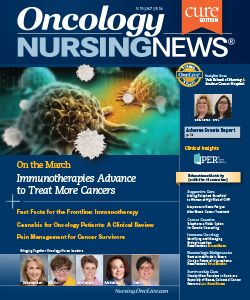Immunotherapy’s March Underscores the Nurse’s Crucial and Constant Role
OncLive Chairman, Mike Hennessy

OncLive Chairman,
Mike Hennessy
It’s hard to keep up with all of the advances happening in immuno-oncology, the progress has been that rapid and impressive. This year alone, the FDA announced several new approvals, expanding the use of immunotherapeutic agents in head and neck cancer and Hodgkin lymphoma, to name only a few. At the same time, findings from clinical trials exploring these therapies in other settings suggest they are poised to bring hope to even more patients.
As the “first line of defense” in the management of side effects, oncology nurses need to stay abreast of these developments, so they can educate patients on how immunotherapies work and why it’s so important to alert their providers early to any immune-related adverse events.
Throughout this issue of Oncology Nursing News, you will find information to assist you, as more of these immunotherapies make their way into the clinic. Immunotherapy is the focus of a new department we’re introducing this month, “Fast Facts for the Frontline,” where readers will be able to find “just the facts” on topics affecting your daily practice in a 1-page, nurse-written, reference tool.
Marijuana legalization efforts continue to grab headlines, and if you’re like me, you’re wondering how this ever-changing legal landscape impacts the care of patients with cancer. In this issue, Ellen Carr, RN, MSN, AOCN, a clinical educator at Moores USCD Cancer Center in California, updates readers on the use of cannabis-based products in oncology practice and explains why it’s so important to promote research to better elucidate how they may be put to work in the oncology setting.
One thing is certain in cancer research—there is a lot of it, and that means oncology nurses need to be continually updated when these developments make their way into the clinic. This November, the Chemotherapy Foundation Symposium will offer nurses an opportunity to do just that, with nurse-led, CE-accredited sessions on such issues as oral adherence, pain management, hair loss, and more. As Memorial Sloan Kettering Cancer Center’s Ann Culkin, RN, OCN, explains, oncology nurses advocate for patients at every level—throughout their disease—and acquiring new knowledge is a form of advocacy for patients.
However and wherever you access that learning, we couldn’t agree more, and we hope that the information you find in this issue and on our website, Nursing.OncLive.com, will support you in these efforts.
As always, thank you for reading.
—Mike Hennessy
Chairman and CEO

Innovative Program Reduces Nurse Turnover and Fosters Development
Published: September 12th 2024 | Updated: September 12th 2024The US Oncology Network (The Network) has developed one of the most comprehensive programs in the nation to support the professional development and retention of new oncology nurses.


